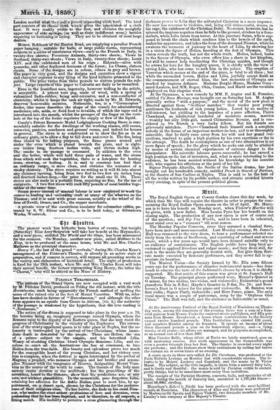- PARISIAN TIMATRICAtS.
The patrons of the Grand Opera are now occupied with a vast work by M. Felieien David, produced on Friday the 4th instant, with the title Hfrcuianum, such being apparently the French method of spelling the name of the ruined city at the foot of Mount Vesuvius. With us, scho- lars have decided in favour of "Herculaneum," and although the other form appears in an epistle from Cicero to Atticus, (vii. 3,) the authority of the passage is weakened by the hypothesis, that the true reading is " s.Eculanum."
The action of the drama is supposed to take place in the year A.D. 79, the heroine being an imaginary personage named Olympia, whom the Romans raise to the dignity of an Eastern queen, that she may rbsist the progress of Christianity in the vicinity of the Euphrates The corona- tion of the newly-appointed queen is to take place at Naples, but the so, lemnity is interrupted by the arrival of two Christians, whose imme- diate death is demanded by the people. These are Helios, the son- of a prince subject to the empire, and his betrothed Lille. Weary of shedding Christian blood Olympia dismisses Lilia, and re- solves to exert all the fascinations she has at command, to lure Helios from the true-faith. Her beauty and splendour prove too much for the susceptible heart of the young Christian, and her victory over him is complete, when the festival is again interrupted by the arrival of Magnus, a prophet, who menaces Olympia and her brother and accom- plice Nicanor with the vengeance of Heaven, designating Mount Vesu- vius as the source of the wrath to come. The threats of the holy man merely excite derision in the multitude; bat the ramblings of the mountain, heard in the distance, show that his predictions are, at any rate, not without plausibility. In the meanwhile, poor forgotten Lila, retaining her affection for the fickle Helios, goes to meet him, by ap- pointment, cru a desert spot, chosen by the Christians for-the-perform- ance of their religious rites. To her honer, she finds in his stead Nice- nor, who makes the most ardent professions of love and devotion, even pretending that he has been baptised, and is therefore, in all respects, a fitting match. His inability to perceive a cross glimmering through the
.darkness proves to Lilia that the self-styled Christian is a mere impostor. He now has recourse to violence, and, being still unsuccessful, denies, in his rage, the existence of the Christian Deity. No sooner, however, has he uttered the impious negation than he falls to the ground, stricken by a thun- derbolt, while Lilia faints from terror. At this juncture Satan, who is sup- posed to break the chain which confines him to the bowels of the earth, makes his appearance, and takes the form of the deceased Nicanor, while he awakens the torments of jealousy in the heart of Lilia, by showing her in a vision the figure of Helios, kneeling at the feet of Olympia. This vision reveals the truth, but not the whole truth. Helios, indeed, basks in the favour of Olympia, who even offers him a share in her kingdom, but still he cannot help recollecting the Christian maiden, and though he avows his love for the haughty queen, it is chiefly with the view of saving Lilia, who has come to seek him in the palace. The eruption of Vesuvius which occurs at the end of the ece, is fatal to all three ; but while the reconciled lovers, Helios and Lila, joyfully accept death as the commencement of eternal bliss, the last momenta of Olympia are marked by impious defiance. Madame Borghi-Mamo, Madame Guey- mard-Lauters, and MM. Roger, Obin, Coulon, and Marie are the vocalists employed on this singular work.
At the Gymnase, a new comedy by MM. E. Angier and E. Foussier, entitled Un Beau Manage, was brought out on Saturday last. M. Angier generally writes "with a purpose," and the moral of the new piece is directed against those "brilliant matches" that render poor young gentlemen the husbands of rich young ladies. Lured by no motive of self-interest, but yielding to the impulses of a pure affection, Pierre Chambaud, an intellectual batehelor of moderate means, marries a wealthy but silly little girl, named Clementine Bernier, and is con- sidered uy his friends a very lucky fellow. But his friends are grievously mistaken. Pierre Chambaud finds himself such a complete nobody in the house of an imperious Mother-in-law, and is so thoroughly miserable, that he fairly runs away from his wife and her grand con- nections, resolved to gain a high position by his own exertions or die in the attempt. The death he contemplates as one of two alternatives is no mere figure of speech; for the glory which he seeks can only be attained by means of certain chemical experiments of extreme danger to the manipulator. His scientific labours prove successful; he has earned a high position on the list of inventors, and, what is more interesting to the audience, he has been assisted without his knowledge by his contrite wife, who regains his affections at the peril of her life, Signor Pasquale Altavilla, the Scribe of the Italian drama, has just brought out his hundredth comedy, entitled Punch in Search of Fortune, at the theatre of San Carlino at Naples. This is said to be the beet of all the works written by its prolific author, and attracts crowded houses- every evening, in spite of the present political gloom.


























 Previous page
Previous page